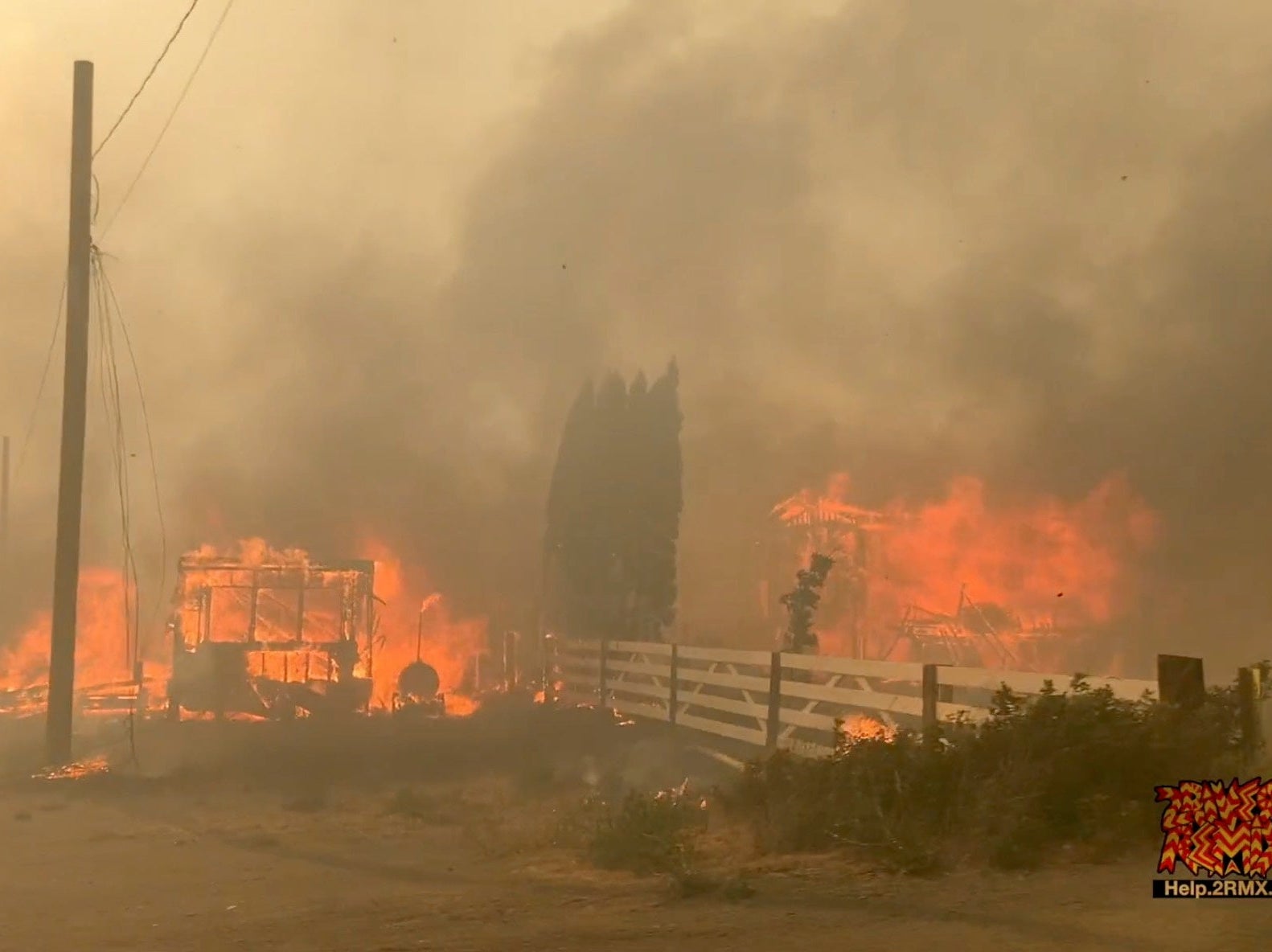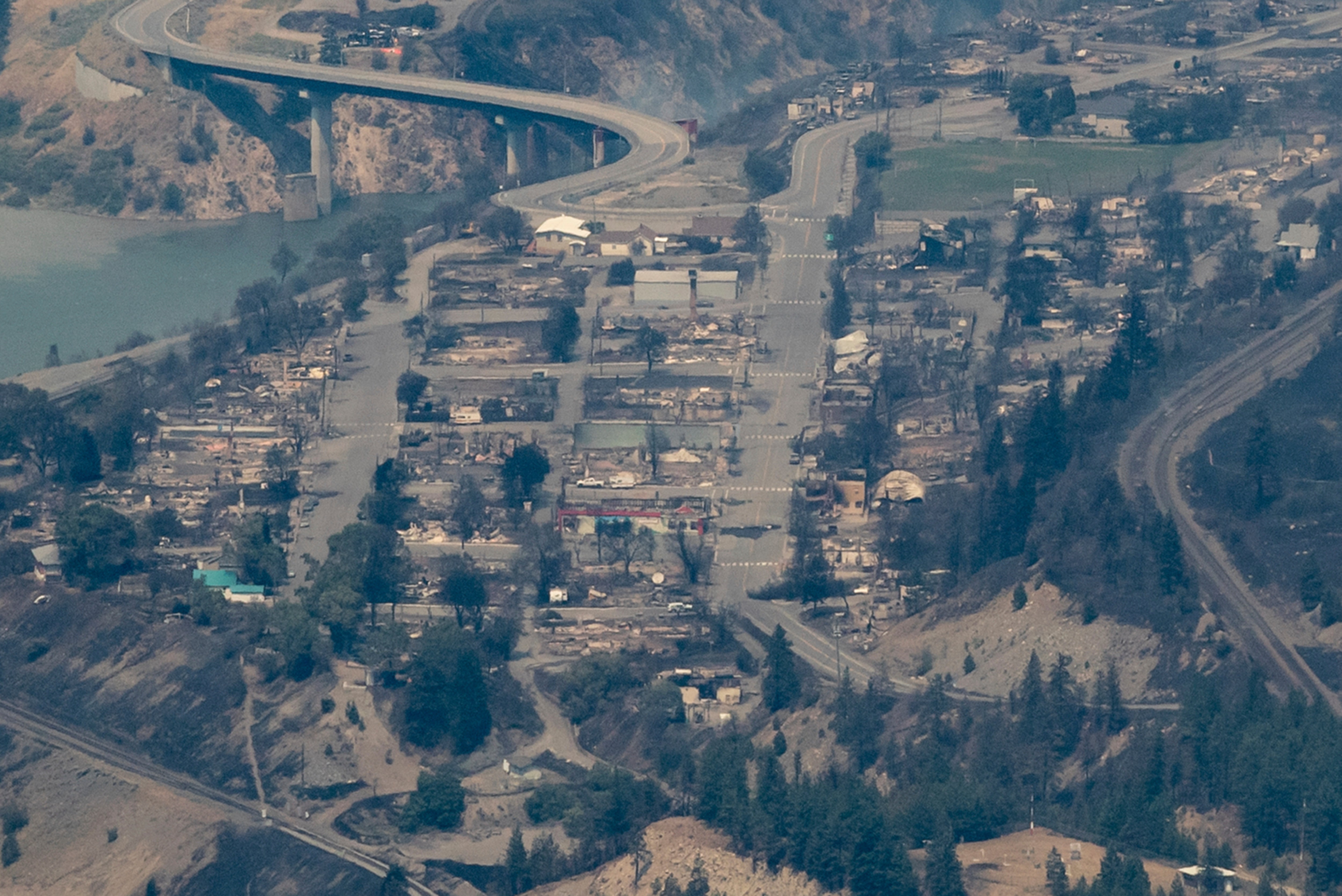Shocking aerial photos reveal ‘warzone’ destruction in Canada’s hottest town after wildfire ‘sparked by a train’
Lytton’s homes and buildings have been mostly destroyed and some local people are still unaccounted for, officials say
Your support helps us to tell the story
From reproductive rights to climate change to Big Tech, The Independent is on the ground when the story is developing. Whether it's investigating the financials of Elon Musk's pro-Trump PAC or producing our latest documentary, 'The A Word', which shines a light on the American women fighting for reproductive rights, we know how important it is to parse out the facts from the messaging.
At such a critical moment in US history, we need reporters on the ground. Your donation allows us to keep sending journalists to speak to both sides of the story.
The Independent is trusted by Americans across the entire political spectrum. And unlike many other quality news outlets, we choose not to lock Americans out of our reporting and analysis with paywalls. We believe quality journalism should be available to everyone, paid for by those who can afford it.
Your support makes all the difference.In Lytton, Canada’s temperature record was broken on Tuesday when the mercury hit 49.6C (121F).
Less than 24 hours later the small village in British Columbia was evacuated, with just minutes notice, as wildfires broke out.
Public officials now say that most of the town’s homes and buildings have been destroyed, as well as the ambulance station and the local Royal Canadian Mounted Police detachment. Some local people are still unaccounted for, as of Friday.
There are a number of fires burning in the region which had been trapped under a “heat dome” for days, bringing blistering-hot temperatures.

The BC Wildfire Service said one blaze near Lytton was raging out of control over an area spanning roughly 30 square miles (80 square kilometers).
BC Premier John Horgan said on Thursday that there were 62 new fires and 29,000 lightning strikes in the past 24 hours in province and the fire risk remained extreme.
Mr Horgan also said that he had “anecdotal information” that one fire had been sparked by a train traveling through the village.
Lytton resident Cheryl James evacuated with her daughter and son-in-law. She told CBC on Thursday that her son, Edward, stayed behind to help fight the fire.
“He told me to leave, and I told him he better not stay too late,” Ms James said from the evacuation centre. “I hope he’ll come here”.
Edith Loring-Kuhanga, an administrator at the Stein Valley Nlakapamux School, said she and fellow board members had to cut short a Zoom interview with a prospective teacher as the fire burned down their block.
She said she initially didn’t pay attention to a siren going off outside, but then got a call from a school board member telling her to flee.
“He said, ‘I’m down here at the fire and you got to leave, grab whatever you can quickly,’” Loring-Kuhanga told the Associated Press.
The wreckage was extensive, she said.
“It was just unbelievable. It was just a nightmare,” she said. “So many community members have lost everything, they just didn’t have time.”
Before its peak temperature on Tuesday, Lytton - which sits on roughly the same latitude as London – had set Canadian records for highs on three consecutive days. On Monday, the temperature was 47.9C (118.2F) and Sunday, 46.1C (115F).
The deadly “once-in-a-millennium” heatwave blasting parts of North America has broken temperature record after temperature record amid a mounting death toll, feared to be in the hundreds.

The state of Oregon reported 63 deaths from the heatwave, and hundreds of hospital visits linked to heat-related illness.
In Multnomah County, where Portland is located, the medical examiner attributed heat deaths to hyperthermia, an abnormally high body temperature caused by a failure of the body to deal with heat. The victims ranged in age from 44 to 97 and a number of homeless people are among those who died.
As temperatures reached 111F degrees in Bend, Oregon, two men at a homeless camp died on 27 June, according to The Bulletin.
The soaring heat is believed to have killed a worker who died in the fields at Ernst Nursery and Farms in St Paul, Oregon, on Saturday. His nephew identified him as Sebastian Francisco Perez, originally from Ixcan, Guatemala, who had just celebrated his 38th birthday, AP reported.
The director of farmers’ union PCUN called the death was “shameful”. Concerns have been raised by various farm workers unions about the conditions workers have been forced to endure in the extreme heat.
In Washington at least 20 people have died from the heat with officials expecting that number to rise. Some people have been discovered dead in their homes, the fatalities linked to heat-related stress.
In British Columbia, Coroner Lisa Lapointe reported at least 486 “sudden and unexpected deaths” in the last five days. She said an average number of deaths in that period would be about 165 people.
“While it is too early to say with certainty how many of these deaths are heat related, it is believed likely that the significant increase in deaths reported is attributable to the extreme weather,” Dr LaPointe said.
In the US Pacific northwest, the city of Portland, Oregon, reached 46.7C (116F) on Monday, breaking the previous record of 44.4C (112F) on Sunday.
In Washington state, Chelan County outside of Seattle reached 48C (119F) on Tuesday.
This part of the world typically sees average highs of around 26C, or in the 80F-mark, during summer months.
The intense heatwave is being caused by what meteorologists call a “heat dome” – which traps concentrations of hot air over an area, blocking other weather systems from moving in.
The climate crisis, driven largely by decades of burning fossil fuels, is contributing to the heat and making such events more intense and more frequent.
The extreme temperatures were also spiking the threat of wildfires. The US National Interagency Fire Center, which coordinates fire response at a federal level, reports that California and more of the US northwest is facing above normal fire potential for the next two months.
A number of fire departments began issuing warnings ahead of Fourth of July weekend, banning the use of fireworks.
AP contributed to this report

Join our commenting forum
Join thought-provoking conversations, follow other Independent readers and see their replies
Comments